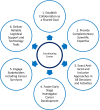Coordinating Centers as a Strategy for Accelerating Cancer Epidemiology Consortia: Best Practices
- PMID: 35223371
- PMCID: PMC8860276
- DOI: 10.1007/s40471-022-00282-z
Coordinating Centers as a Strategy for Accelerating Cancer Epidemiology Consortia: Best Practices
Abstract
Purposeof review: This review highlights six "best practices" for cancer epidemiology coordinating centers to facilitate the success of a research consortium.
Recent findings: Evidence from emerging literature regarding the Science of Team Science suggests that coordinating centers can more effectively foster collaborative cancer epidemiology research in consortia by (1) establishing collaboration as a shared goal at the start, (2) providing scientific expertise complementary to the research sites that adapts over the course of the project, (3) enacting anti-racist and inclusive approaches in all consortium decisions and activities, (4) fostering early-stage investigator career development, (5) engaging stakeholders including cancer survivors as peers, and (6) delivering reliable logistical support and technology tools with planned process evaluation so that researchers can collaboratively focus on the science.
Summary: By drawing on the Science of Team Science, coordinating centers can accelerate research progress and increase the impact of cancer epidemiology consortia.
Keywords: Cancer epidemiology; Coordinating centers; Team science.
© The Author(s) 2022.
Conflict of interest statement
Conflict of InterestAmy Trentham-Dietz, Jennifer Bird, Ronald E. Gangnon, Sara Lindberg, Tena Madison, Kristen Malecki, James Shull, Claudia Vredeveld, and Betsy Rolland declare no conflicts of interest. Amy Trentham-Dietz, Ronald E. Gangnon, Kristen Malecki, James Shull, and Betsy Rolland report grants from NIH outside the submitted work.
Figures


References
-
- National Research Council. Enhancing the effectiveness of team science. Cooke NJ, Hilton ML, editors. Board on Behavioral, Cognitive, and Sensory Sciences, Division of Behavioral and Social Sciences and Education. Washington, DC: The National Academies Press; 2015. Available at: 10.17226/19007. - PubMed
-
- Office of Extramural Research, National Institutes of Health, U.S. Department of health & Human Services. RePORTER, version 2020.9, available at https://reporter.nih.gov/ Accessed 05/18/2021 [updated 05/15/2021].
-
- Rolland B, Lee CP, Potter JD. 'Greater than the sum of its parts': a qualitative study of the role of the coordinating center in facilitating coordinated collaborative science. J Research Administration Spr. 2017;48(1):65–85.
-
- Rolland B, Paine D, Lee CP. Work practices in coordinating center enabled networks (CCENs). Proceedings of the 18th International Conference on Supporting Group Work. Sanibel Island, Florida, USA, ACM: 194–203. 2014.
Publication types
Grants and funding
LinkOut - more resources
Full Text Sources
